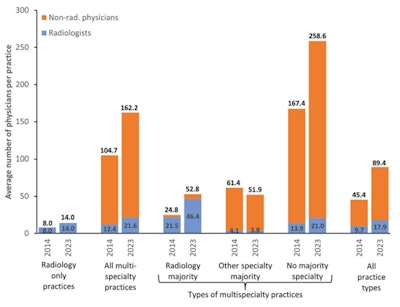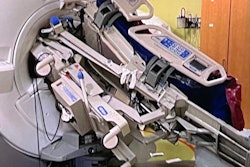Radiologist consolidation into larger and/or multispecialty practices may foster subspecialization and improve negotiation power, according to a study published June 5 in the American Journal of Roentgenology.
A team led by Eric Christensen, PhD, of the Harvey L. Neiman Health Policy Institute in Reston, VA, reported that "an overall decrease in the number of radiology practices and concurrent growth in the number of radiologists [between 2014 and 2023] was mirrored by shifts from small toward large practices and from radiology-only toward multispecialty practices, consistent with ongoing practice consolidation."
The researchers used data from the U.S. Centers for Medicare and Medicaid Services (CMS) from between 2014 and 2023 to identify all U.S. radiologists and their affiliated practices. The team categorized these physicians based on the practice's specialty mix (radiology-only or multispecialty); multispecialty practices were further grouped into the following cohorts: radiology-majority, other-specialty-majority, or no-majority-specialty. Christensen and colleagues also tracked temporal shifts to identify any consolidation patterns.
The group found the following:
| Changes in practice characteristics, 2014 to 2023 | |
|---|---|
| Measure |
Percentage changes between 2014 and 2023 |
| Number of radiologists in practice |
+17.3 |
| Radiology-affiliated practices |
-14.7% |
| Radiology-only practices |
-31.8% |
| Radiologist-affiliated multispecialty practices |
+12.3% |
| Number of radiologists in a practice | |
| 1 to 2 |
-18.7% |
| 3 to 9 |
-34.4% |
| 10 to 24 |
+25.2% |
| 25 to 49 |
+33.2% |
| 50 to 99 |
+121.6% |
| 100 or more |
+348.5% |
 Mean numbers of radiologists per practice (values in bars), and mean numbers of all physicians per practice (numbers above bars), for practices with at least one affiliated radiologist in 2014 and 2023, stratified by practice type. Graphic and caption courtesy of the AJR.
Mean numbers of radiologists per practice (values in bars), and mean numbers of all physicians per practice (numbers above bars), for practices with at least one affiliated radiologist in 2014 and 2023, stratified by practice type. Graphic and caption courtesy of the AJR.
"While determining causes of consolidation were beyond this study's scope, the shifts may relate to economic incentives and legislative changes favoring large multispecialty practices," the researchers concluded.
The complete study can be found here.



















